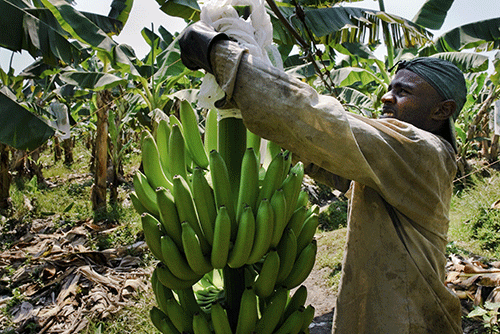The Namibian Agronomic Board (NAB) and the country’s leading agricultural solutions company AvaGro have signed a transformative agreement that will see both entities join efforts to develop the country’s banana industry in areas of research and implementation.
During the signing ceremony, which recently took place at the AvaGro Farm in Swakopmund, NAB’s CEO Fidelis Mwazi and AvaGro’s CEO Leonie Hartmann
expressed the growing need for Namibia to develop the banana industry and catch up with the rest of the world.
Last year alone, Namibia imported a total of 6 394 tonnes of bananas, valued at N$57 million, mainly from neighbouring South Africa.
Bananas remain the second most highly-consumed fruit in Namibia after Apples – and the country imports 100% of all its banana needs. Small-scale productions are taking place
in the Zambezi and the two Kavango regions, as well as in the north-central, Karst and central production zones of the country, these are primarily for farmers’ consumption and hardly reach the local market.
“This MoU will, therefore, address the main challenge hindering banana production in the country, which is access to high-quality and disease-free banana seedlings that not only have better yield and taste – but are also adaptable to Namibia’s climatic conditions,” said Mwazi.
Hartmann pointed out that the seedlings will be produced in a tissue culture laboratory – and thereafter, field trials will be conducted in the different production zones of Namibia that have favourable climates and soil before being released for commercial production. This initiative, she said, will benefit small and large-scale farmers located in the targeted production zones.
Meanwhile, bananas and plantains are important staple foods in many developing countries, especially in Africa, banana starch, flour and chips are processed banana products, whose markets are yet to be fully developed on the continent.
One of the indisputable food products that Africa contributes to the world is bananas, whose production has grown at an average of 3% globally.
Uganda is the largest producer of banana and plantain in sub-Saharan Africa,
followed by Rwanda, Ghana, Nigeria and Cameroon.
Bananas & plantains
Bananas are cultivated in nearly all tropical regions of the world. Of particular importance to Africa is the East African Highland Banana (EAHB), which is a staple starchy food for 80 million people and an important source of income.
There are 120 EAHB varieties in Uganda alone that are not found anywhere else in the world.
Meanwhile, plantains resemble bananas but they are longer, have a thicker skin and contain more starch. They are also a major staple food in Africa, Latin America and Asia.
They are usually cooked and not eaten raw unless they are very ripe. Plantains are more important in the humid lowlands of West and Central Africa.
One hundred or more different varieties of plantain grow deep in the African rainforests.
Climate challenges
As it is, the banana is a delicate plant that is easily affected by temperature fluctuations, which leads to low production and possibly the eventual death of the crop.
Climate change remains the biggest threat to general food security globally and in Africa, where it is most felt, the livelihood of millions is at risk if temperatures continue soaring.
Climate change is, however, not the only threat to the banana crop, as diseases that have also been spreading at an alarming rate are a danger too.
In 2015, a fungus, dubbed Tropical Race 4, decimated the crop in the entire southeast Asia.
In fact, the disease was first discovered in Australia, Jordan, Mozambique, Pakistan, the Middle East and Africa as far as 2013.
It was so severe that it destroyed whole plantations in those countries.
At the time, in 2015, researchers warned that developing new banana cultivars was an arduously expensive affair that would probably not curtail the spread of the disease in time.
But years later, the banana crop remains resilient in most parts of Africa with the International Institute of Tropical Agriculture, saying that bananas and plantains are important staple foods in many developing countries, especially in Africa.
- ohembapu@nepc.com.na


